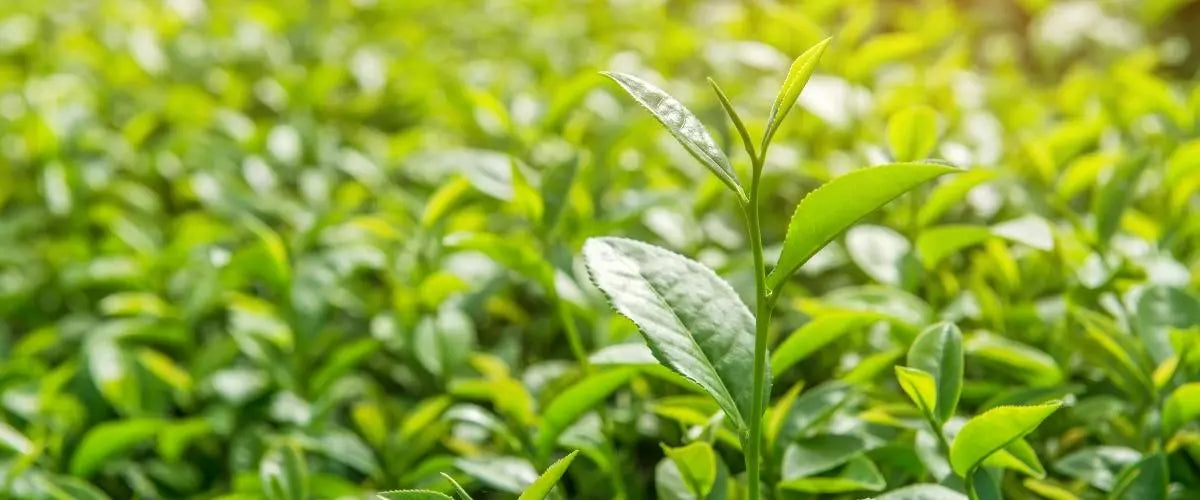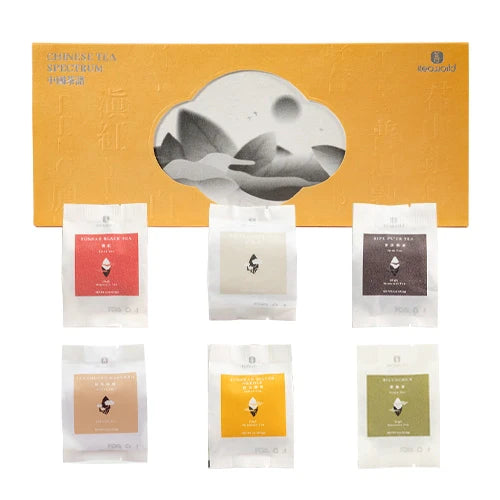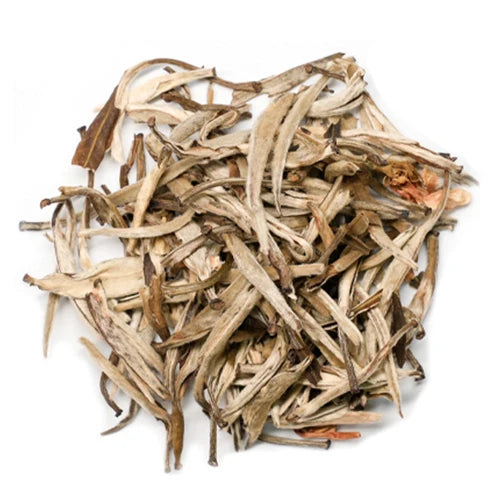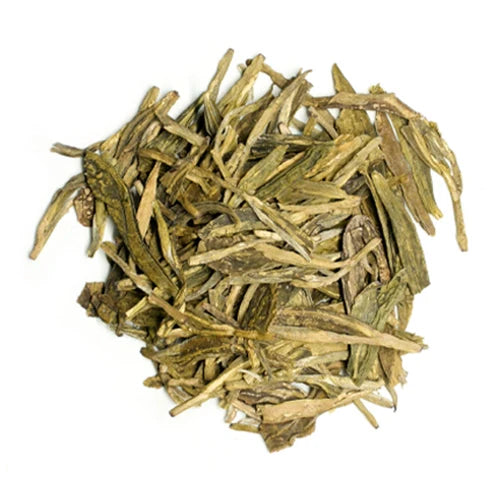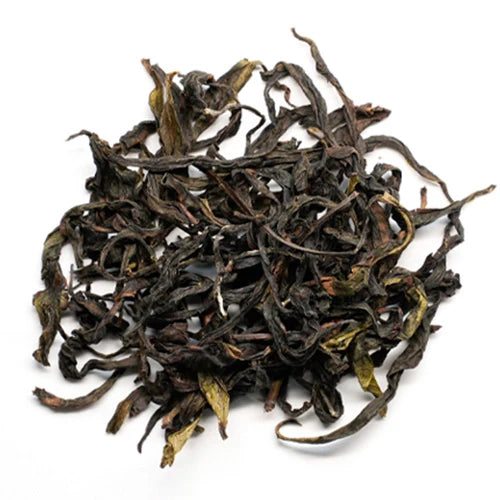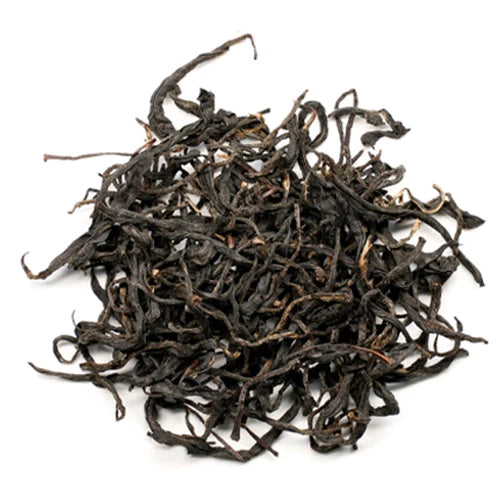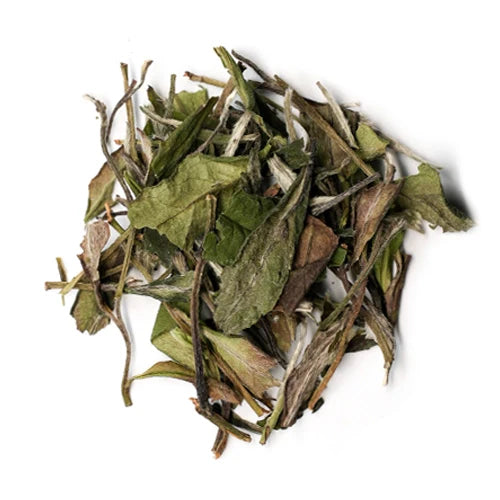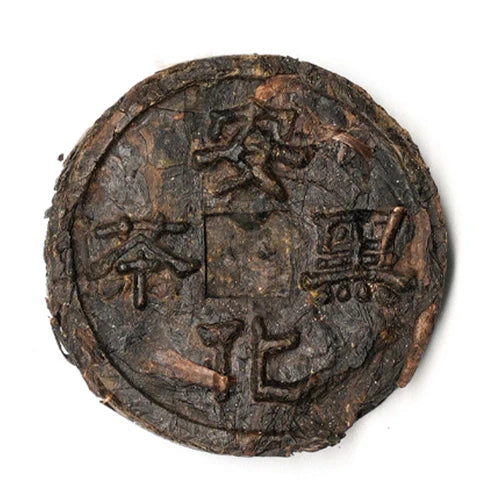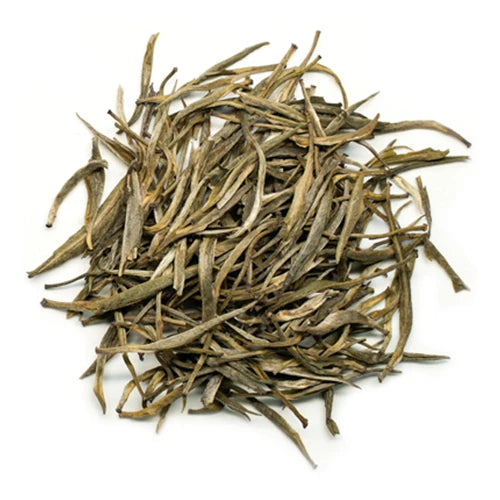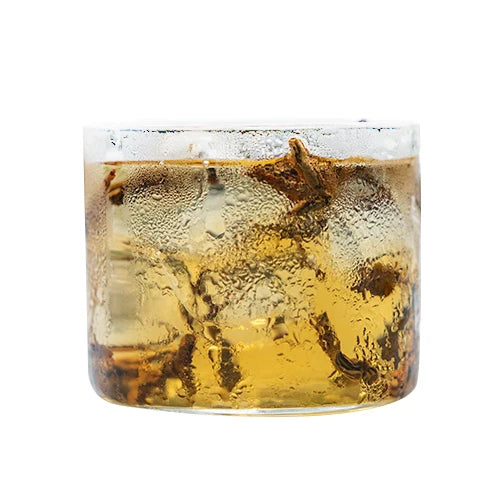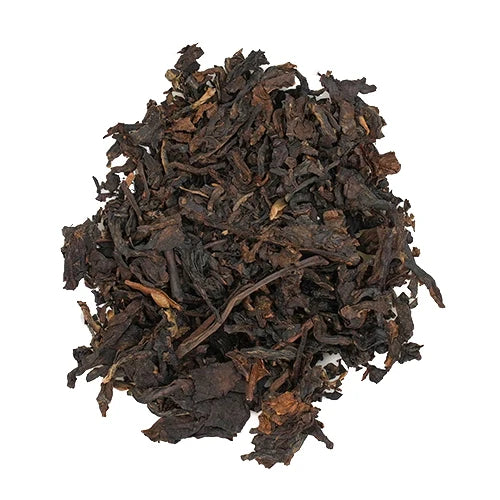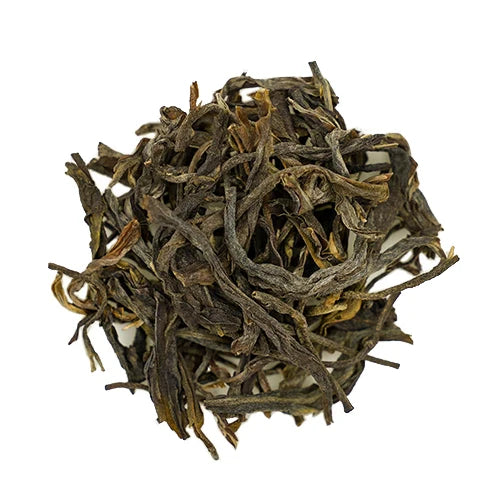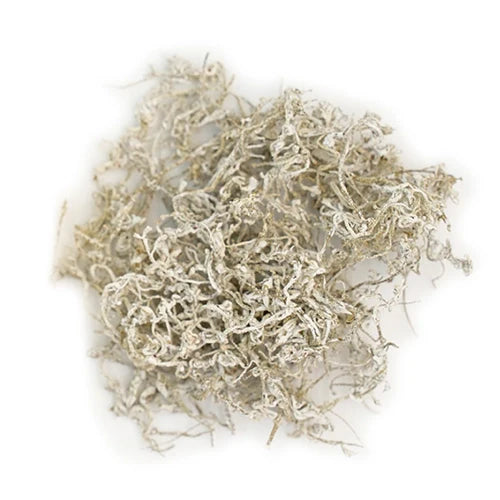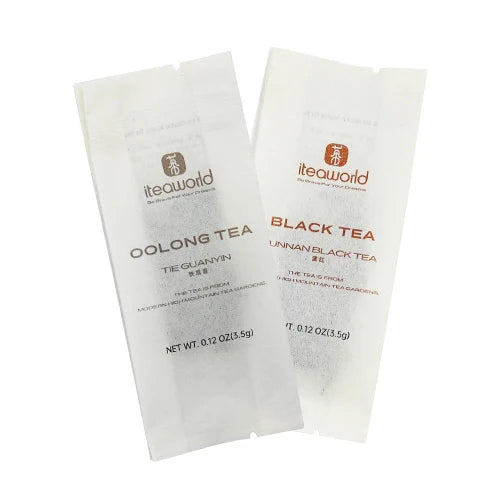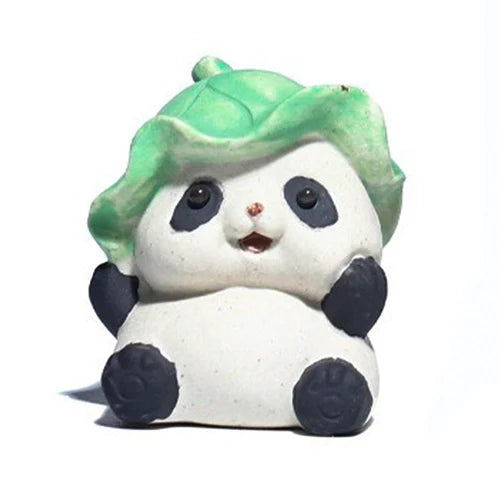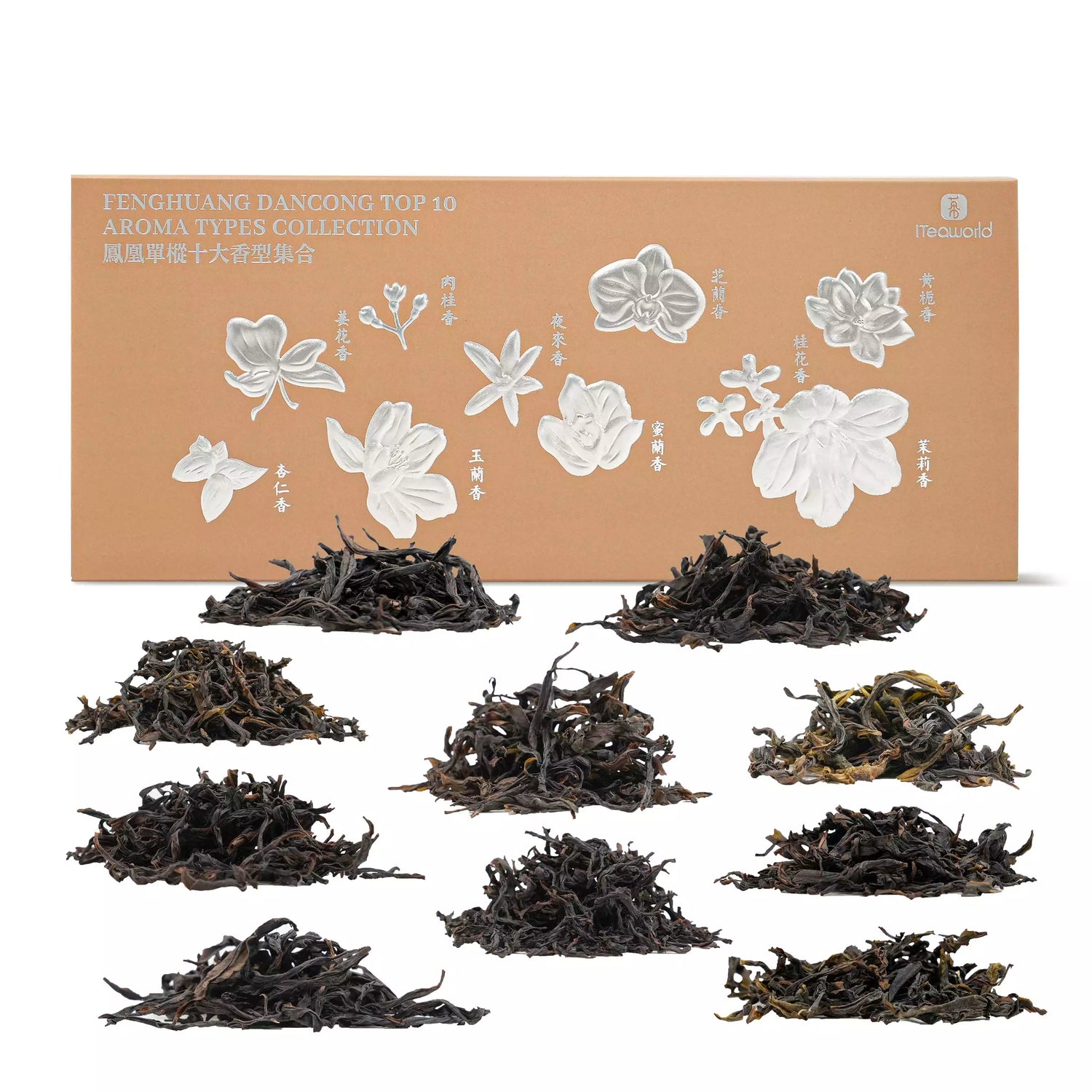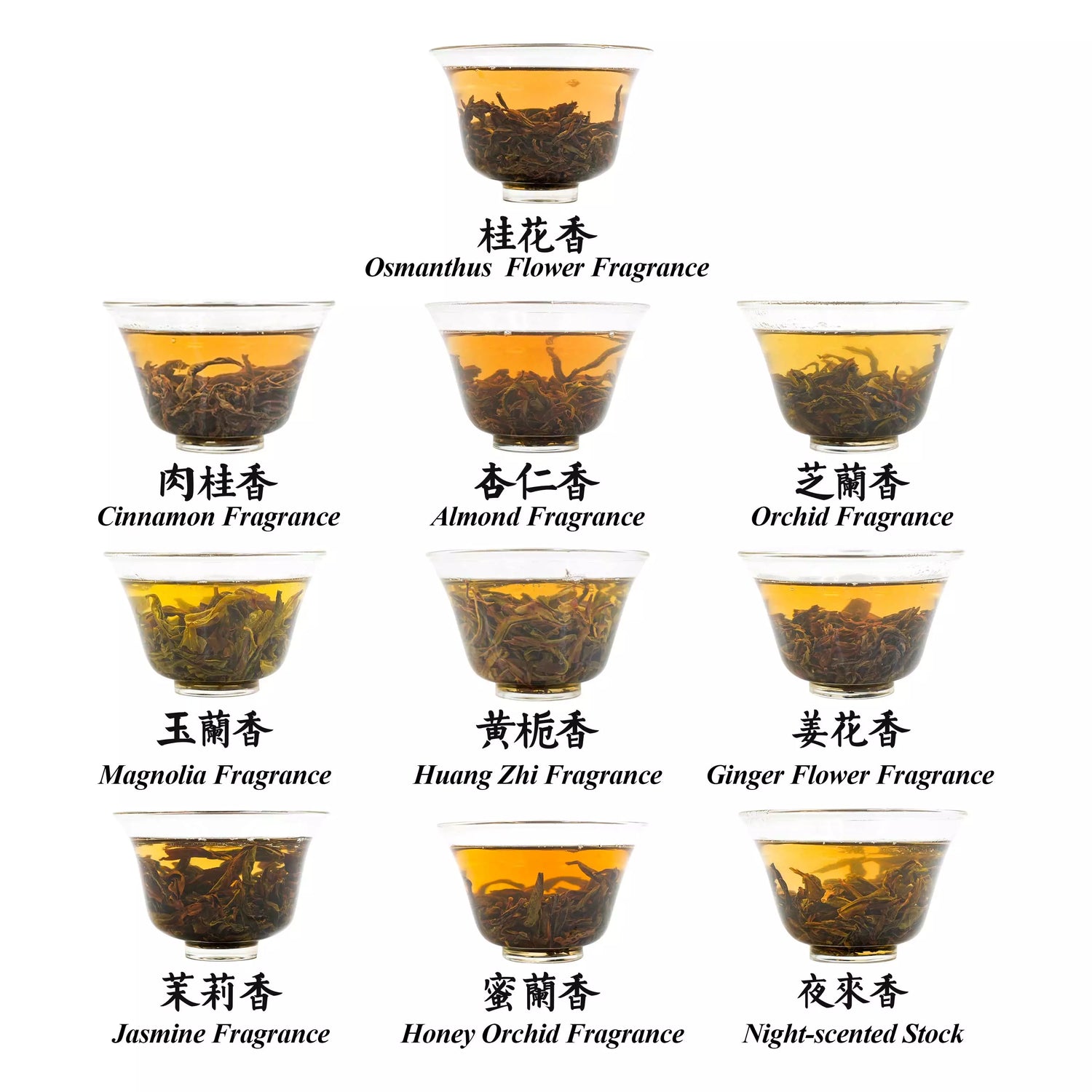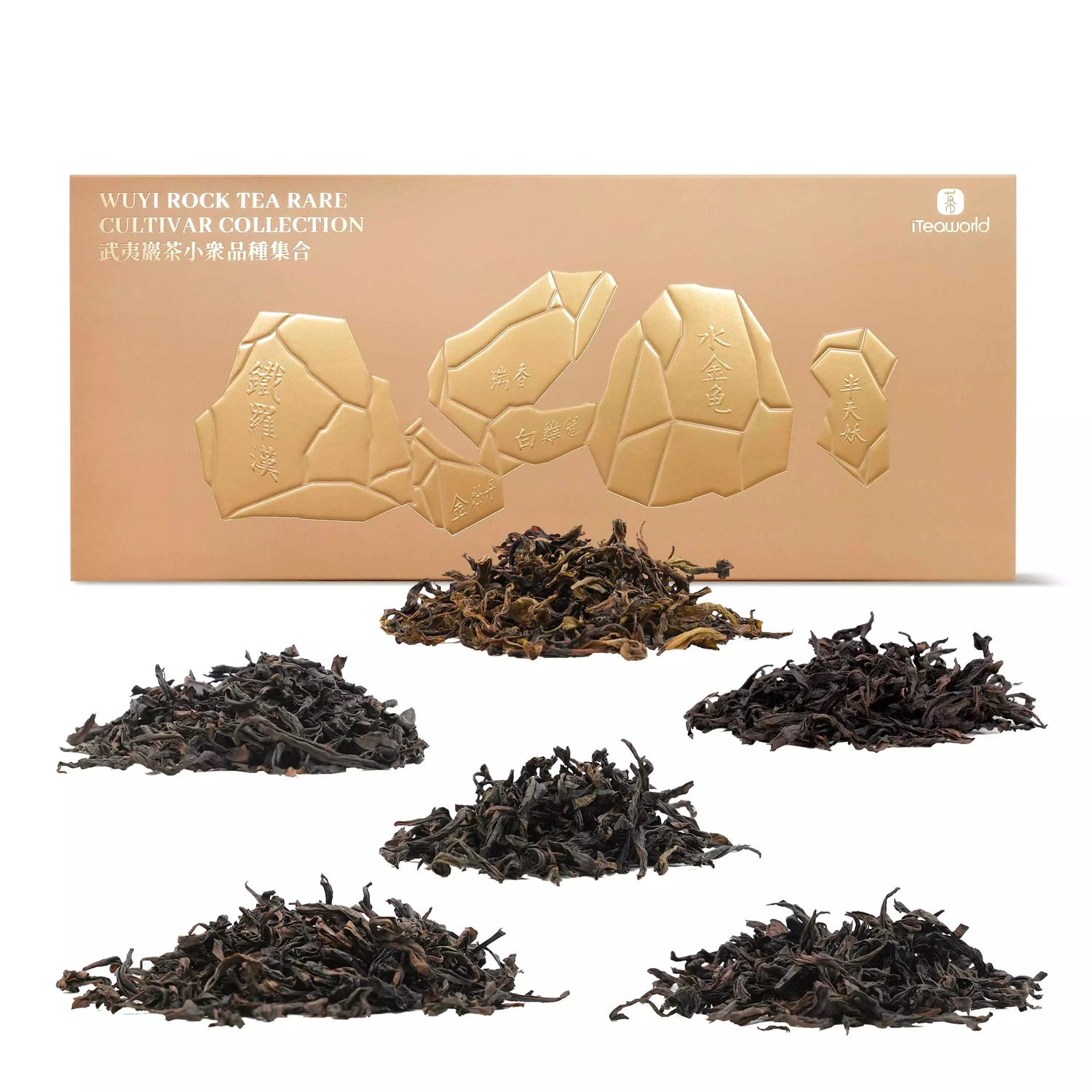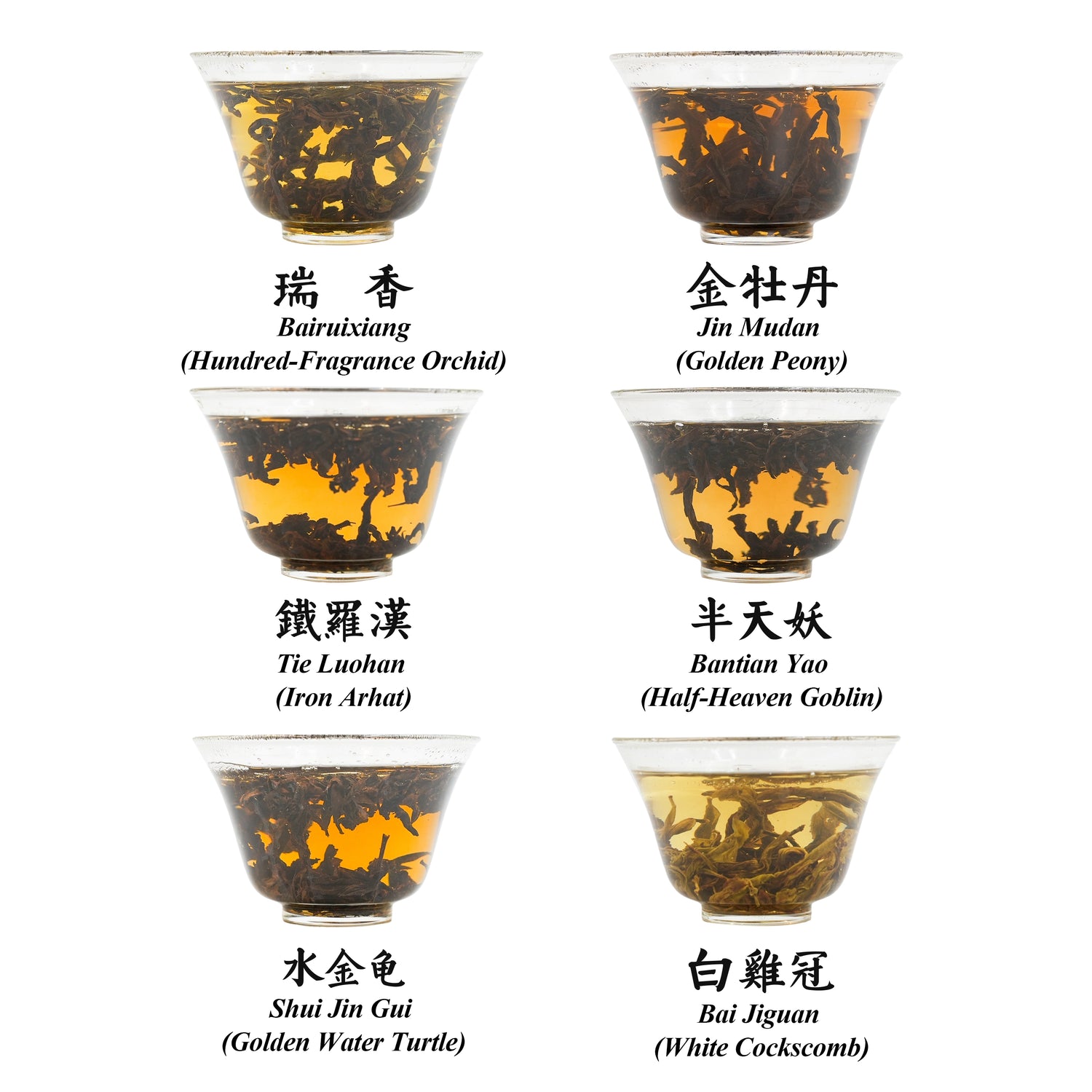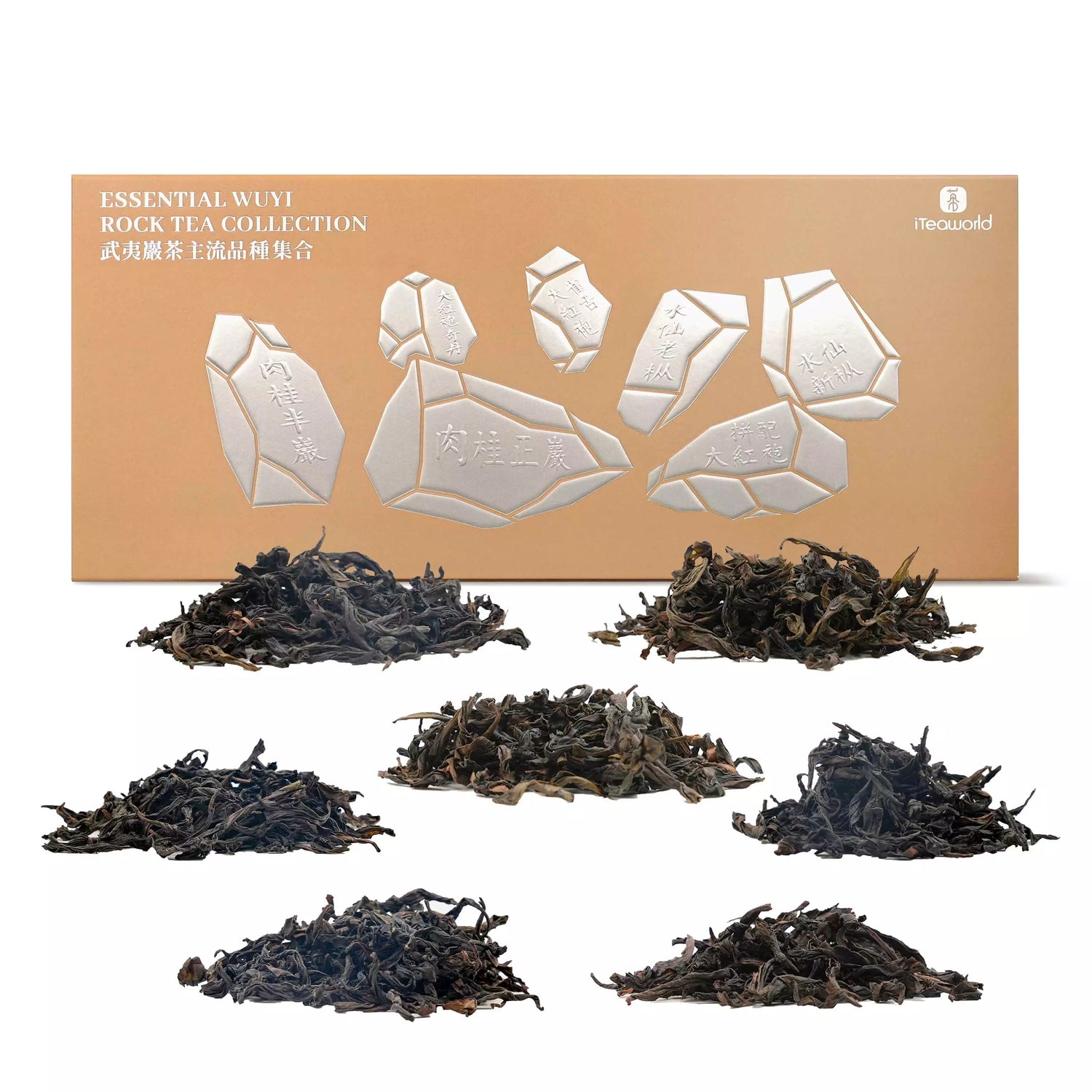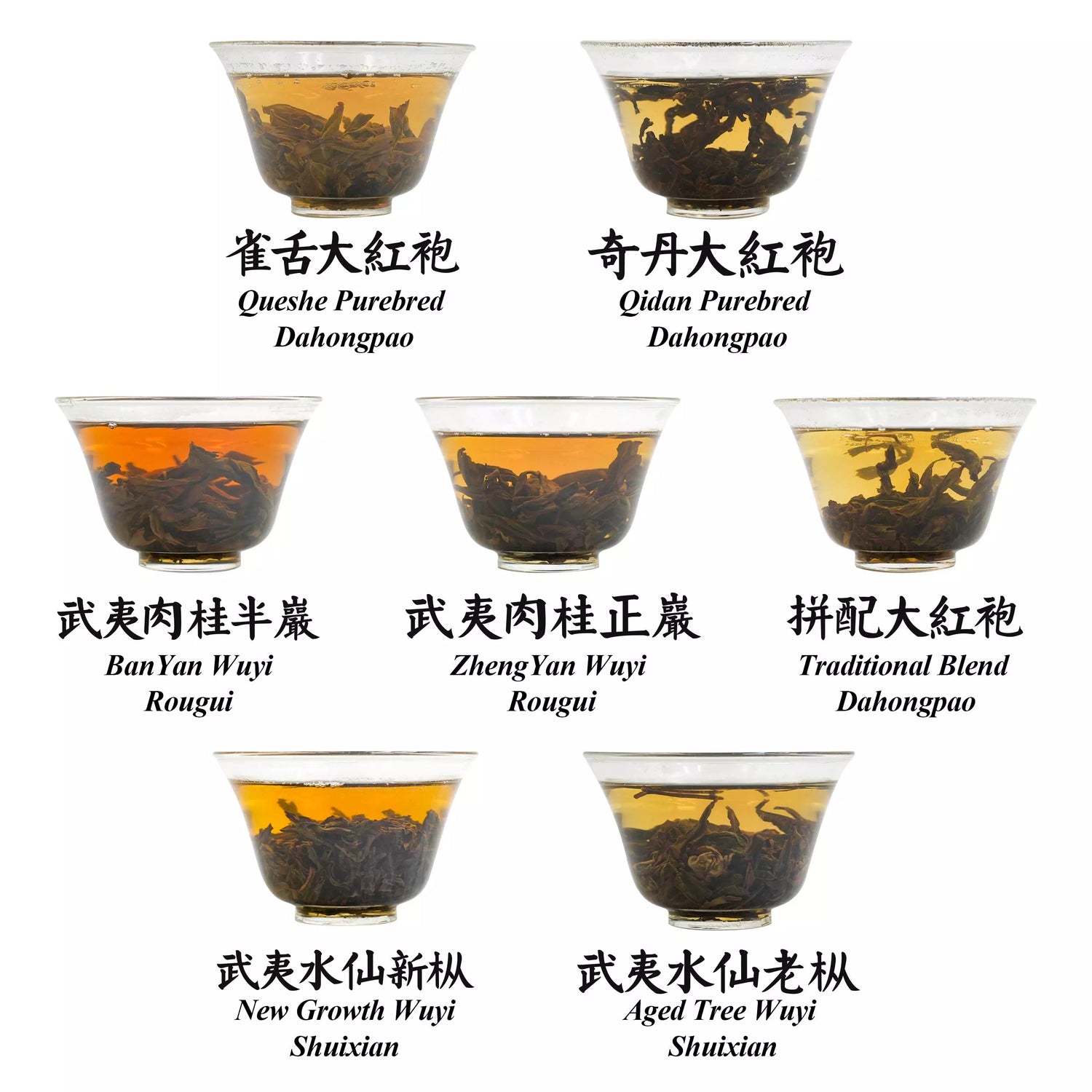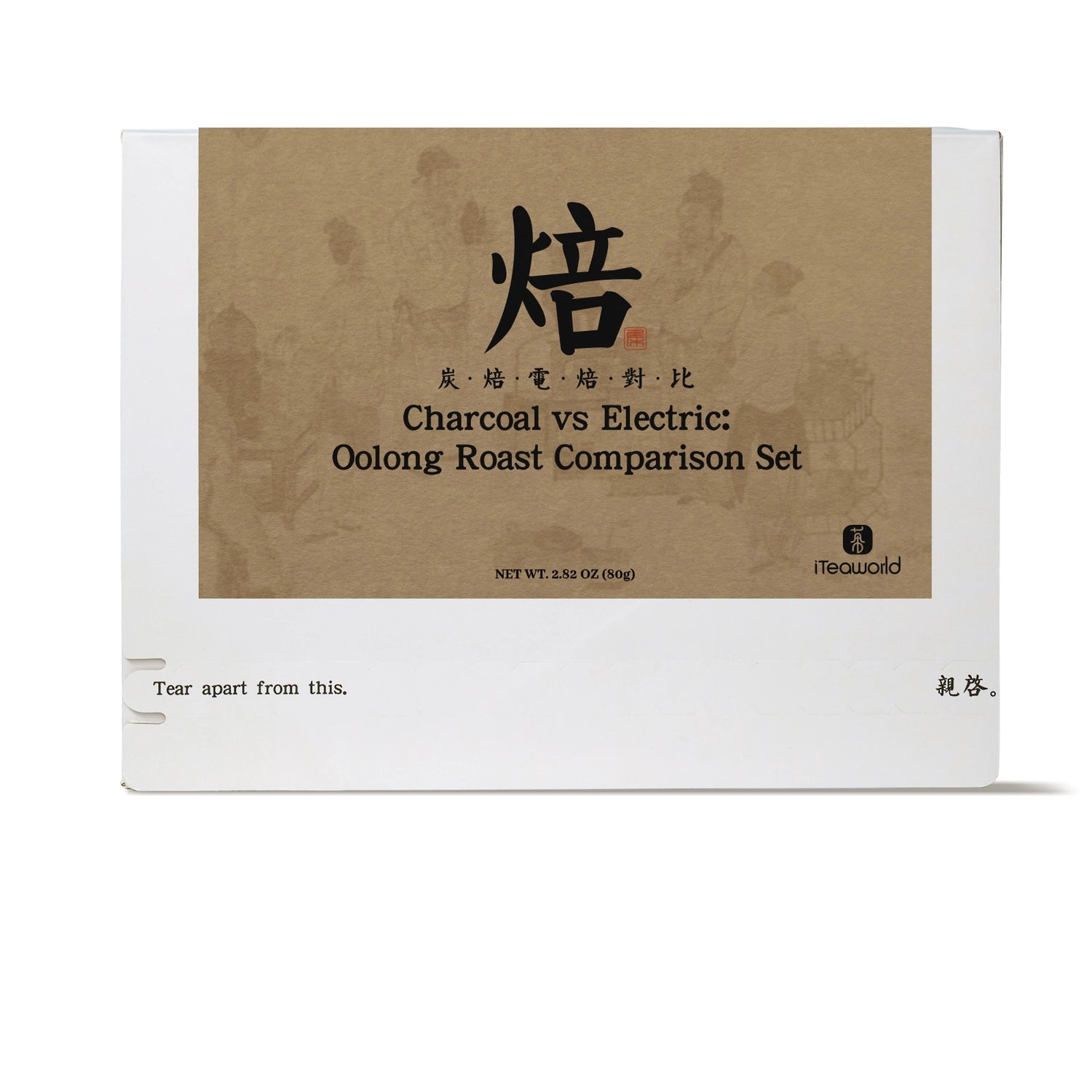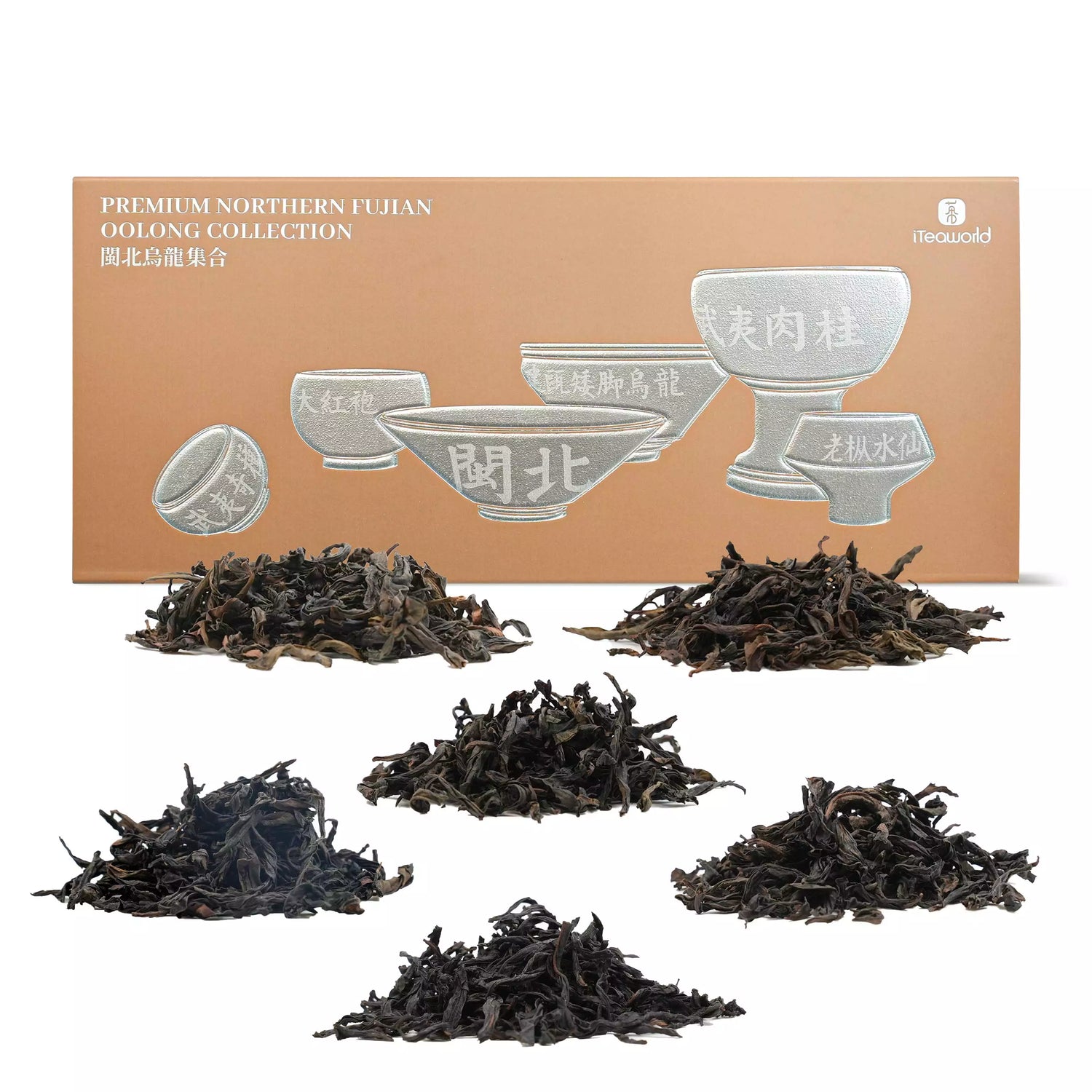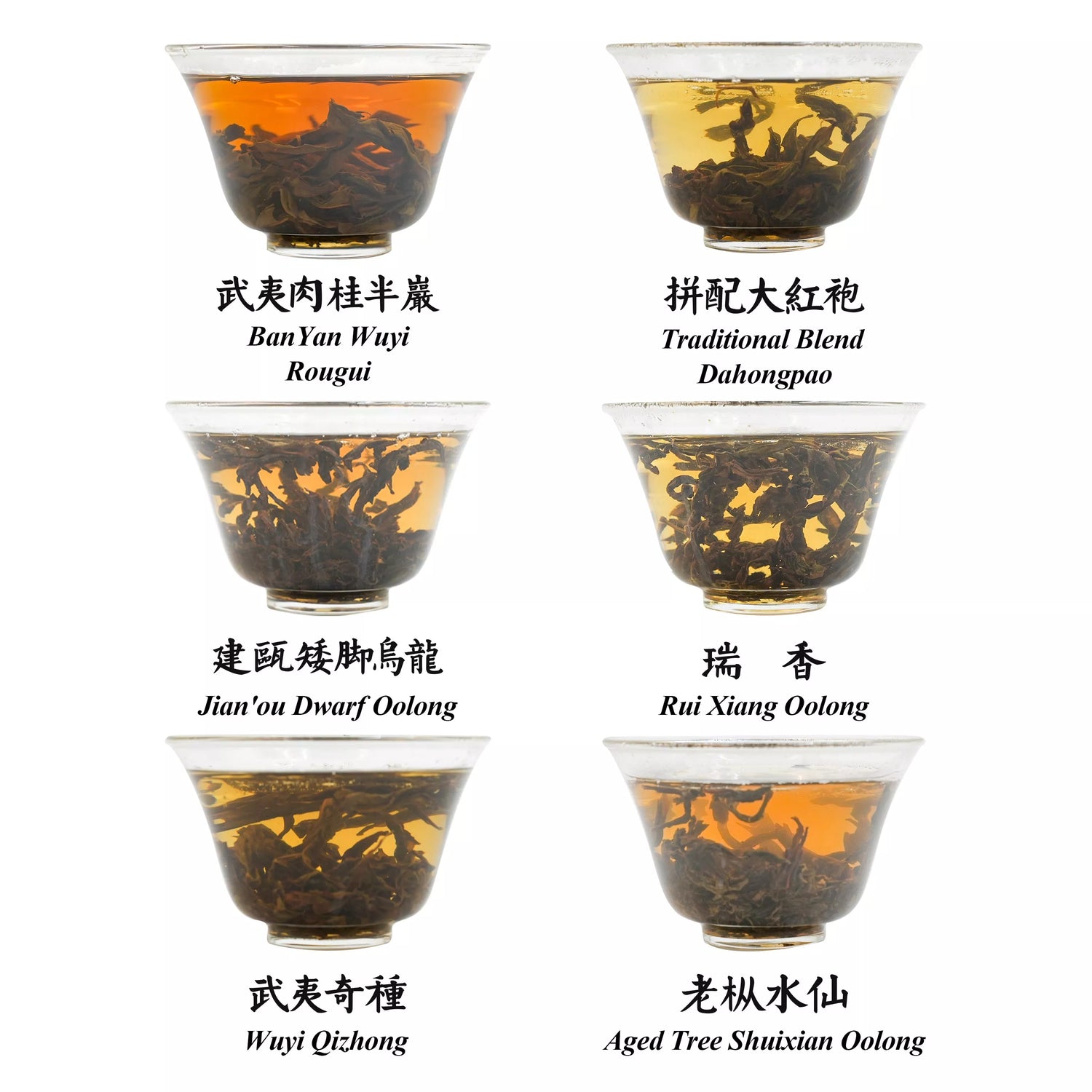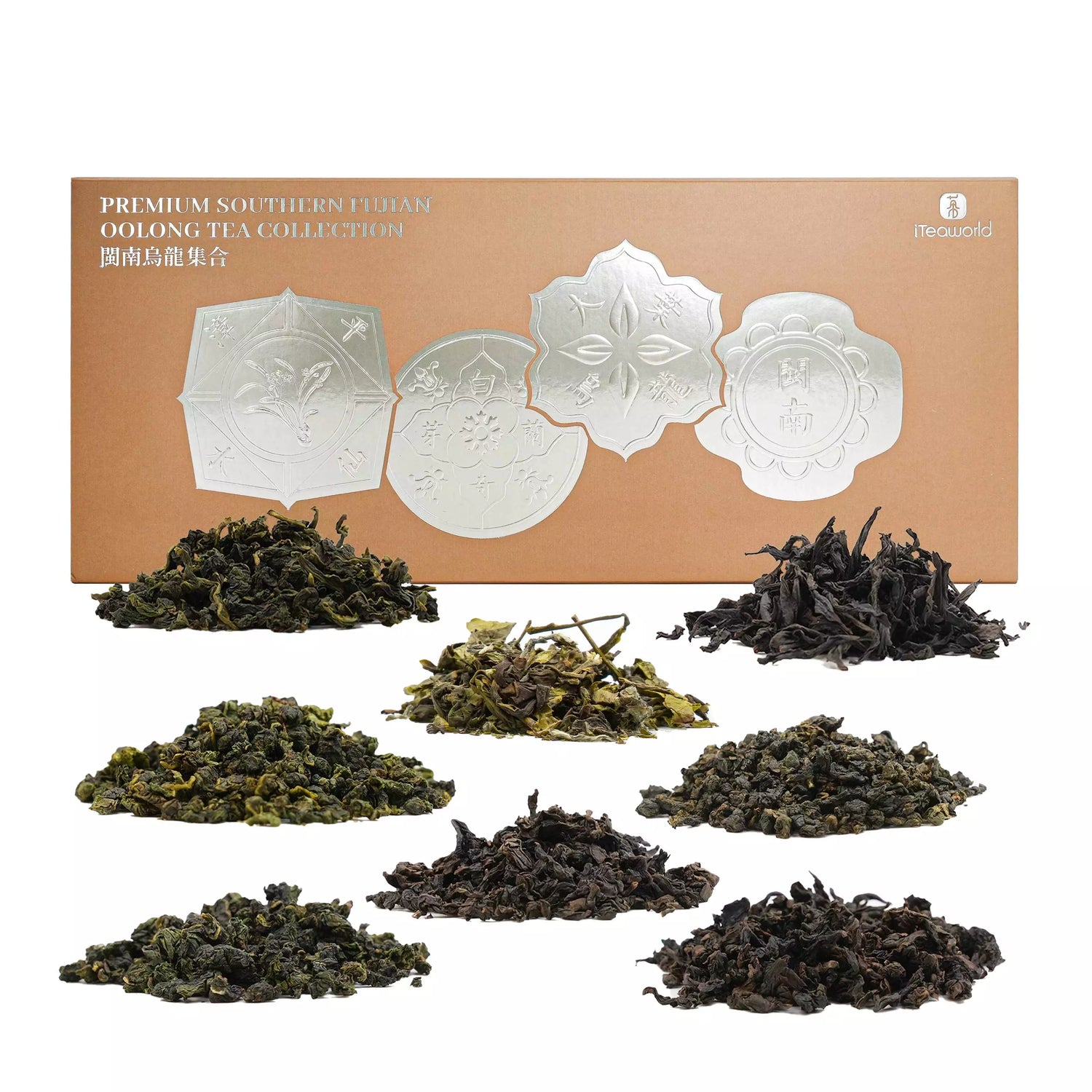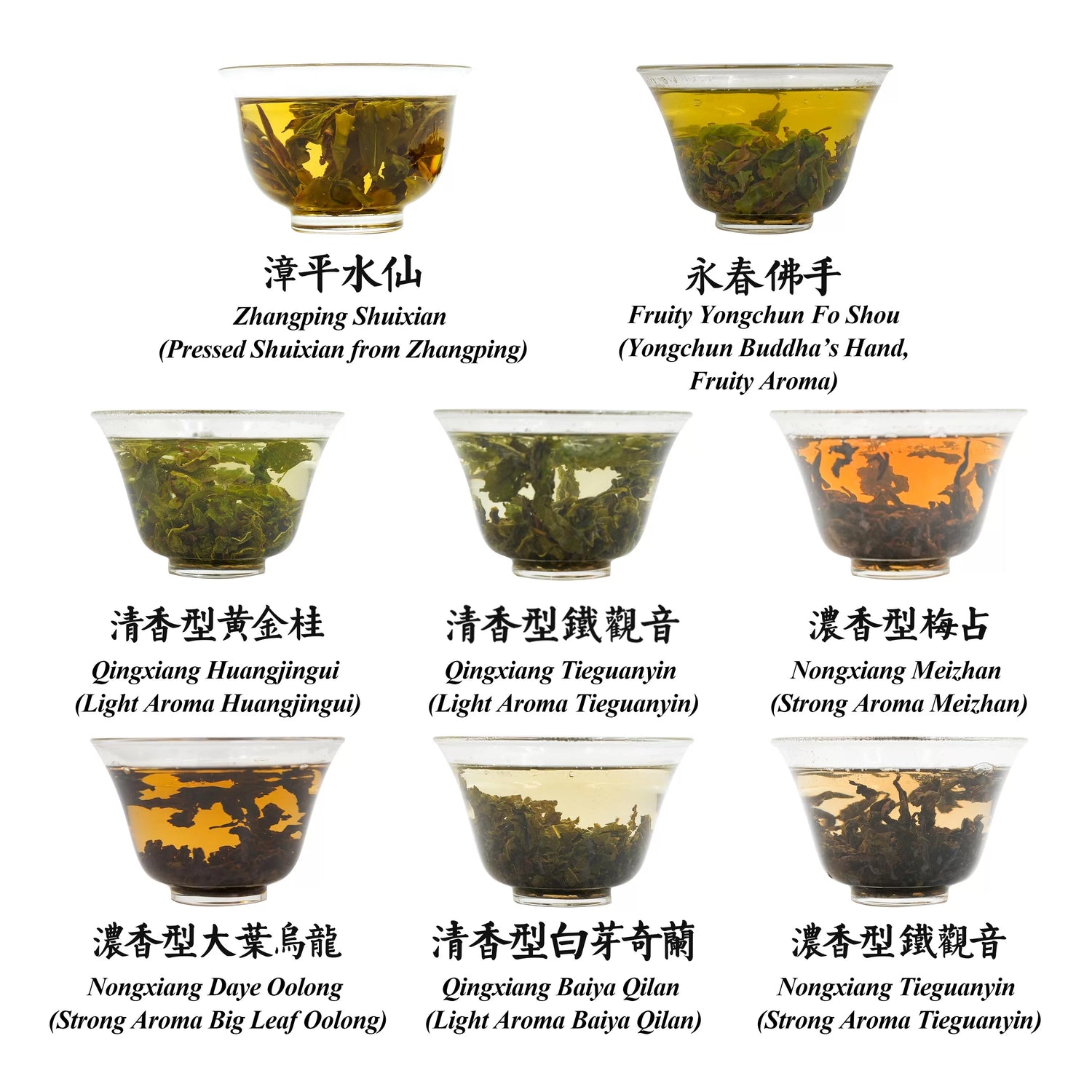Sort by:
26 products
26 products
Fenghuang Dancong 10 Aromas Collection
Discover the essence of Chinese Gongfu tea culture with this unique Fenghuang Dancong oolong tea set, featuring 10 distinct natural aromas like Jasmine, Gardenia, Honey Orchid, and more. Known as the "perfume of tea," this collection showcases the diverse flavors created by different tea bush varieties from Fenghuang Town, the heart of Dancong tea production.
Whether you’re a fan of fragrant teas, a Gongfu tea enthusiast, or simply curious about the rich aromas and flavors of oolong tea, this set offers a sensory journey you won’t forget. Beautifully curated, it’s an ideal gift for tea lovers who appreciate authentic, aromatic, and high-quality teas.
What is Fenghuang Dancong tea?
Fenghuang Dancong tea is a type of oolong tea, which is selected and bred from the Fenghuang Shuixian group. Each individual plant has its own unique shape and variety, forming its own product line, hence the name "Dancong," which means "single bush" or "single strain." This tea is mainly characterized by its ability to withstand multiple infusions, its strong aftertaste, and its high, lingering aroma. It's known as the most fragrant oolong tea due to its distinctive fragrance. Based on different aromatic types, Fenghuang Dancong is divided into various scented categories.
The product includes:
Fenghuang Dancong Oolong Tea(Huang Zhi Fragrance)2*5g
Fenghuang Dancong Oolong Tea(Orchid Fragrance)2*5g
Fenghuang Dancong Oolong Tea(Honey Orchid Fragrance)2*5g
Fenghuang Dancong Oolong Tea(Magnolia Fragrance)2*5g
Fenghuang Dancong Oolong Tea(Ginger Flower Fragrance)2*5g
Fenghuang Dancong Oolong Tea(Osmanthus Aroma)2*5g
Fenghuang Dancong Oolong Tea(Cinnamon Fragrance)2*5g
Fenghuang Dancong Oolong Tea(Almond Fragrance)2*5g
Fenghuang Dancong Oolong Tea(Night-scented Stock)2*5g
Fenghuang Dancong Oolong Tea(Jasmine Fragrance)2*5g
Origin:
Fenghuang Town, Chaozhou City, Guangdong Province.
Introduction to the Top 10 Fragrance Types of Fenghuang Dancong Tea
Fenghuang Dancong Oolong Tea(Huang Zhi Fragrance):A high-quality single bush tea with a natural gardenia fragrance.
Fenghuang Dancong Oolong Tea(Orchid Fragrance):Features the aroma of orchids, fresh and subtle.
Fenghuang Dancong Oolong Tea(Honey Orchid Fragrance):The most popular type, known for its strong honey flavor combined with orchid fragrance, hence the name Milan.
Fenghuang Dancong Oolong Tea(Magnolia Fragrance): Fresh and elegant, with the aroma of magnolia flowers.
Fenghuang Dancong Oolong Tea(Ginger Flower Fragrance):Also known as 'Penetrating Heaven Fragrance', named for the uplifting ginger flower scent when the tea is brewed.
Fenghuang Dancong Oolong Tea(Osmanthus aroma): Reminiscent of osmanthus flowers, sweet and lingering.
Fenghuang Dancong Oolong Tea(Cinnamon Fragrance): Named for the tea's flavor that resembles the taste of cinnamon, a traditional Chinese medicine.
Fenghuang Dancong Oolong Tea(Almond Fragrance):Also known as 'Sawtooth', named for the serrated edges of the leaves, with a distinct almond aroma.
Fenghuang Dancong Oolong Tea(Night-scented Stock): Night-scented Stock Dancong is famous for its unique evening fragrance and flavor. It's mainly produced in Fengxi Dan Lake, Fenghuang Town, and is quite rare.
Fenghuang Dancong Oolong Tea(Jasmine Fragrance): A unique fragrance type with the scent of jasmine flowers, refreshing and delightful.
Brewing Tips
Recommended Method: Traditional Gongfu style.
Best Teaware: White porcelain gaiwan or Yixing clay teapot.
Tea-to-Water Ratio: Use 5g of tea for 100ml of water.
Water Temperature: 212℉ (100℃).
Steeping Times:
First rinse: Quick pour, discard the rinse.
2nd–5th infusions: Steep for 6–8 seconds.
6th–10th infusions: Steep for 10–15 seconds.
Brewing Durability: Authentic Dancong from Chaozhou's Fenghuang region can be steeped 12–15 times.
Technique: Pour water along the edge of the gaiwan in a steady stream. Tilt the lid slightly to leave a small gap to prevent over-steaming.
Rare Wuyi Rock Tea Cultivars: Hidden Gems from the Core of Zhengyan
While teas like Da Hong Pao, Rou Gui, and Shui Xian have become well-known representatives of Wuyi Rock Tea, the rare cultivars—such as Tie Luo Han, Bai Ji Guan, Shui Jin Gui, and Ban Tian Yao—tell a deeper, more authentic story. These teas originate from wild, heirloom tea trees that have grown for centuries in the heart of the Wuyi Mountains, shaped by natural selection and careful cultivation. They embody the original genetic heritage of Wuyi rock tea.
Grown on remote cliffs and craggy ledges in the Zhengyan core production zone—places like Guidong Cave and Sanhua Peak—these tea trees sink their roots deep into rocky crevices, drawing in rare minerals. The result is a flavor profile marked by the elusive and unmistakable "Yan Yun" (rock rhyme) that connoisseurs revere.
Who would enjoy this tea?
This collection is perfect for those who have explored the classic Wuyi rock teas and are ready to dive deeper into its rare and distinctive varieties. It includes historically renowned teas like Tie Luohan, Bàn Tiān Yāo, Bai Ji Guan, Shui Jin Gui, and Bai Rui Xiang, along with newer, highly sought-after cultivars like Rui Xiang and Jin Mudan. A journey through the diverse flavors and craftsmanship of Wuyi rock tea.
A semi-fermented oolong tea grown in the rocky crevices of Fujian’s Wuyi Mountain, renowned for its unique "rock bone floral aroma" (Yan Yun). Only tea cultivated within Wuyi City’s protected region can bear this name. Other areas (e.g., Anxi) do not produce Rock Tea.
This collection features the three most iconic Wuyi rock teas—Da Hong Pao, Shuixian, and Rougui—along with their key variations. You’ll taste the difference between blended and purebred Da Hong Pao, young and old Shuixian trees, and core vs. semi-core Rougui. A guided journey into the depth and complexity of Wuyi rock tea.
A Journey of Fire and Technology
"For centuries, Chinese oolong tea masters have debated: the slow dance of charcoal fire or the precision of electric heat? This kit invites you to explore two roasting philosophies through Phoenix Dancong and Wuyi Rock Tea – one shaped by ancestral wisdom, the other refined by technology."
Product Contains:
Charcoal-Roasted Wuyi Rougui* 20 g
Electric-Roasted Wuyi Rougui* 20 g
Charcoal-Roasted Mi Lan Xiang Dancong* 20 g
Electric-Roasted Mi Lan Xiang Dancong* 20 g
Product Information (Wuyi Rougui)
Type: Semi-Rock (Ban Yan)
Origin: Jingshui Village, Xingcun Town, Wuyishan City, Fujian Province, China
Altitude: 400m
Producer: Chen Hui
Processing Timeline: Maocha: April 2024; Initial Roasting: August 2024; Final Roasting: November 2024
Product Information (Mi Lan Xiang Dancong)
Origin: Fengxi Village, Fenghuang Town, Chaozhou City, Guangdong Province, China
Altitude: 600–800m
Tree Age: ~30 years
Producer: Lin Zhiqiang
Processing Timeline: Maocha: April 2024; Initial Roasting: August 2024; Final Roasting: November 2024
Charcoal Roasting: The Art of Traditional Oolong
Charcoal roasting is the soul of traditional oolong tea. Using slow, low heat from wood like longan or lychee, it transforms the leaves, creating a rich flavor profile with caramel sweetness, mineral notes, and a smoky depth.
This method is perfect for Wuyi Rock Tea and Phoenix Dancong, turning grassy flavors into smooth, complex profiles and bringing out caramel and fruit-like sweetness.
Compared to modern electric roasting, charcoal roasting offers:
Better texture — glossy dark brown leaves vs. greenish-brown
Richer aromas — smoky and natural tea fragrances vs. a single roasted flavor
More infusions — over 8 brews vs. 5
Longer shelf life — improves over 5+ years vs. needing to be consumed within the year
Despite challenges like higher carbon emissions, charcoal roasting is essential for high-end oolong, much like oak barrels for fine wine. It elevates tea from "fresh leaves" to a living, evolving art.
Electric Roasting: The Modern Approach to Oolong Tea
Electric roasting is a key technique in modern oolong tea production, offering significant advantages in efficiency and consistency. Using electric heating elements, the temperature is precisely controlled between 70-130°C, with roasting time typically ranging from 2-5 hours. This process improves production speed compared to traditional charcoal roasting.
One of the standout features of electric roasting is its digital temperature control, maintaining a stable temperature within ±5°C. This eliminates the uneven heat fluctuations common in charcoal roasting, making it ideal for light-fermented oolongs that preserve fresh floral and fruity aromas.
In terms of flavor, electric-roasted teas shine with vibrant floral notes and a refreshing taste. The tea is clear and bright in color. While it lacks the rich depth of charcoal-roasted teas, it meets the demand for light, refreshing tea that modern consumers crave.
How to Brew?
Teaware: Yixing teapot (preferably zhuni clay) or thick-walled gaiwan
Water Quality: Spring water or soft water (hardness < 50 mg/L)
Tea-to-Water Ratio: 5g tea / 100ml water
Water Temperature: 100°C (boiling)
Rinse: Quick rinse with boiling water (under 5 seconds); discard the first infusion
Steeping Times:
Infusions 1–3: 15 seconds each
Infusions 4–10: Mi Lan Xiang: increase by 5 seconds per infusion
Wuyi Rougui: increase by 5–10 seconds per infusion
The Northern Fujian region is considered the birthplace of Oolong tea, and the traditional crafting methods of Wuyi Rock Tea have been recognized as part of China’s intangible cultural heritage. This collection brings together iconic oolong varieties from the Song Dynasty (Wuyi Qizhong and Jian'ou Dwarf Oolong) to today (Blended Da Hong Pao, Wuyi Rougui, Aged Tree Shuixian Oolong ), along with emerging cultivars with great future potential (Rui Xiang Oolong). Each tea carries the unique craftsmanship of the region, with its own distinct story and flavor. We hope this collection will allow you to explore the diverse flavors and rich cultural heritage of Northern Fujian (Minnan) Oolong tea.
Explore the rich legacy of Southern Fujian oolong teas — home to the iconic Tie Guan Yin and Zhangping Shui Xian, both recognized as part of China’s Intangible Cultural Heritage. Since the 17th century, this region has pioneered the art of high-aroma oolongs, known for their floral, fruity, and gently roasted notes. Crafted with time-honored techniques like light oxidation, layered roasting, and meticulous leaf shaping, these teas capture the essence of Minnan tradition. Whether you're a seasoned tea drinker or just beginning your journey, this curated collection offers a true taste of oolong history.
A Boxed Journey into the Essence of Guangdong Oolong
From the ancient Shiguping oolong crafted by the She ethnic group over 1,500 years ago to today’s highly aromatic Dancong teas, this curated set brings together six signature teas from Chaozhou, Meizhou, and Raoping—the three core regions of Guangdong. A flavorful journey through 500 years of tea-making heritage.
The best oolong tea collection for beginners — featuring 10 of the most iconic and popular Chinese oolong teas, with 2 mini tea cakes of each variety (20 pieces total).
Each tea is crafted from carefully selected loose leaves and pressed into convenient 5g mini cakes — just drop into hot water, no teaware needed.
This curated set showcases a broad spectrum of natural oolong flavors, from the fresh floral notes of Tie Guan Yin to the deep roasted richness of Da Hong Pao.
Absolutely no added sugar, artificial flavors, or colors — just 100% natural tea.
It’s the perfect way to explore authentic Chinese oolong tea and discover your personal favorites — a low-risk, high-value journey into real tea without the overwhelm.
Please note: Because the mini cakes are made from full loose leaves that are softened and compressed, some small leaf fragments may appear when steeped—this is completely normal and part of the natural tea experience.
Recently viewed products
Chat with fellow tea lovers, ask questions, and share your tea moments.




